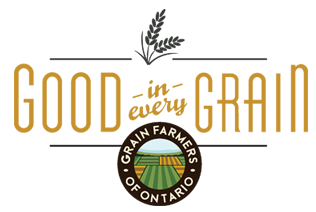Nutritious Ontario grains

Ontario grains can be incredibly nutritious for our bodies. We’ve showcased how whole grains are great to include in a healthy, balanced lifestyle and how they can help reduce your risk of heart disease, diabetes, and some cancers while also aiding in healthy digestion. But, regardless if you’re choosing to eat enriched and/or whole grain foods, choosing to eat grains will still allow your body to get the nutrients it needs.
Nutrients
Grains can contain macro and micronutrients. The macronutrients include carbohydrates, protein, and fat. Grains are classified as a carbohydrate as that is the main macronutrient, but, grains can also contain proteins and fat. The micronutrients include vitamins, minerals, fibre, amino acids, and omega fatty acids. Each whole grain offers a unique combination of various micronutrients.
Barley
Barley is a versatile grain with a chewy texture and nutty flavour, that can be used in lots of recipes. It is also very healthy and nutritious, as it contains lots of fibre and trace minerals like selenium, manganese and phosphorous. You can cook barley as flour, flakes, bran and of course as a whole grain.
Barley provides an excellent source (at least 20% of the recommended daily value) of selenium, a mineral and antioxidant. Selenium helps us to metabolize (the chemical process to turn food into energy) other nutrients and assists with thyroid gland and metabolic functions.
Corn
There are three different types of corn: popcorn, sweet corn (corn on the cob), and grain corn. Grain corn is a whole grain that is used to make a variety of foods or ingredients in the grocery store – in fact over 2,500 grocery store items contain corn! To use grain corn in your cooking, you can use corn oil, corn starch, corn flour and cornmeal. Whole grain corn is high in iron, fibre and phosphorus and vitamins like thiamin or magnesium.
Corn provides an excellent source (at least 20% of the recommended daily value) of the vitamin, thiamin. It assists with energy metabolism and production, and nervous system and muscle tissue functioning and maintenance.
Oats
Oats are naturally high in dietary fibre, iron and vitamins and minerals like phosphorous, manganese and vitamin B. Oats can be good for reducing your risk of heart disease, obesity, blood cholesterol, and even have unique antioxidants to reduce cardiovascular disease and sooth dry, itchy skin.
Oats provide 50% of the recommended daily value of the mineral, manganese. It activates enzymes for bone formation, assists in the metabolism of many nutrients, and helps with blood regulation.
Soybean
Soy milk, soy oil, tofu, miso, soybean paste, soy butter, whole roasted soybeans are all ways to incorporate soybeans in your meals! Soybeans are a complete protein, as they contain all essential amino acids that are necessary for nutrition, and high in folate, vitamin C and a good source of calcium, iron and magnesium.
Soybeans provide our bodies with the vitamin, folate. It is integral in rapid cell growth and division, the synthesis of DNA, RNA and red blood cells, and metabolizing amino acids. Some soy foods like tofu are an excellent source of the macronutrient, protein as well.
Wheat
One of the most known grains grown in Canada and around the world, wheat is a staple in many diverse diets. Often times, wheat is ground into flour and used to make a variety of foods including crackers, bread, cereal, pitas and more.
Wheat provides a good source (at least 10% of the recommended daily value) of the mineral, phosphorus. It helps with energy production, acid-base balance, oxygen delivery, and building strong bones and teeth.
Ontario grains are delicious, smart and incredibly nutritious for us to eat. Try incorporating Ontario grains into your meals using our recipe library, Good in Every Meal.
Registered dietitian notes:
RDV – Recommended Daily Value
good source – providing at least 10% of the recommended daily value
excellent source – providing at least 20% of the recommended daily value



